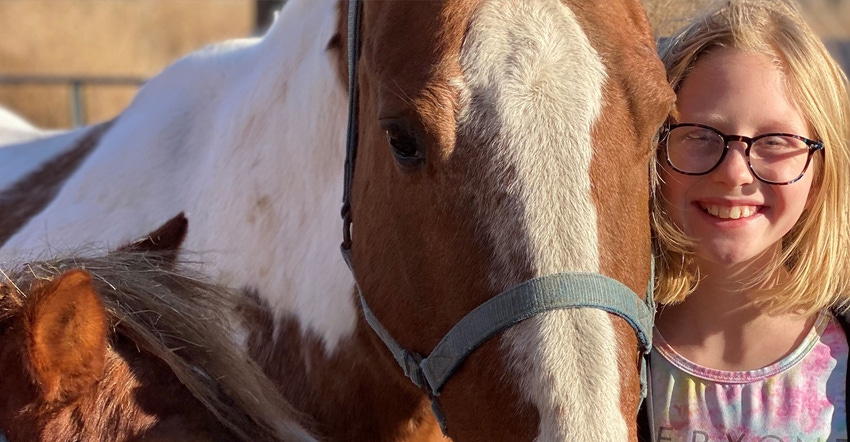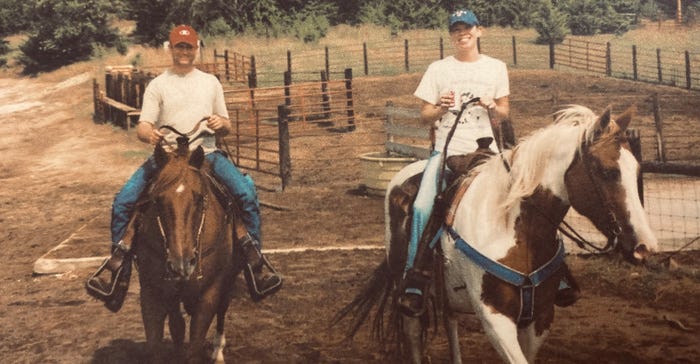December 28, 2022

I was 8 years old and a new 4-H'er when my dad pulled in the driveway with our first horse, Cakes, the fattest sorrel quarter horse you’ve ever seen.
Dad poured concrete for a living, so he paid for Cakes by trading a new driveway with her previous owner. Our family took turns riding that stubborn mare until Mom talked Dad into buying a skinny gelding named Purgatory, who turned out to be an incredible athlete in the show ring.
Dad was a good sport, even trading a shotgun for stud fees, and gradually, our 4-H horse herd grew.
Deciding when to say goodbye
Horses came and went from the yard behind our family’s construction shop, and eventually were “put out to grass” on the farm my husband and I now live on with our four daughters. One by one, the 4-H horses made an exit altogether.
Many folks share similar “coming of age” horse stories. Whether a working farm animal or competition show horse, a horse’s quality of life does, in due course, come to the end of its purpose. But how do you know when to say goodbye to that old friend?
When choosing to retire a horse, Kathy Anderson, Nebraska Extension horse specialist, recommends letting the horse guide the decision.

SERVING THE FAMILY: Holly Wortmann’s husband, Chris, and her sister, Heidi Marsh, ride younger horses on a trail ride near Center, Neb. Whether it is a 4-H horse, working ranch horse or a horse that is kept for pleasure, these majestic animals become part of the farm family. It is often difficult to decide on the proper care as they grow older and less active.
“Pay attention to the horse, and let them tell you,” Anderson says. “Although the most common reason a horse retires is age, that’s not always the case. A horse that is 20 years old may have a lot of years left in them, while a 15-year-old could show signs of decline. Don’t let age decide if a horse has soundness issues, for example, and they can’t perform like they used to.”
Even if scaling back a horse’s activity, Anderson recommends carrying on with the basic health needs of the animal.
“Sometimes because you’re not working them, a horse gets put on the back burner,” she says. “Keep on a schedule of providing the best care. Stick with a deworming and nutritional plan. Senior feeds are a good option and safe, but keep in mind that feeds aren’t age dependent. Just because he’s 25 doesn’t mean he needs special feeds if his condition is well.”
Cost of retirement
Retiring a horse comes with a cost. Anderson says there are two big expenses to consider.
“Foot care is important; and soundness can be a real issue, but there are a few things to try,” she says. “Maybe pull their shoes and see how he gets along. Again, let the horse tell you his needs. Also, dental care is significant. Keeping teeth floated and in good care helps the horse eat and adds longevity to his nutritional needs.”
Sometimes an owner of a horse with special care doesn’t always have an area equipped for the needs of the animal.
“Maybe find a friend that will take your horse as a pasture ornament,” Anderson suggests. “Even if they can’t go down the road like they used to, you might be surprised that some old horses can teach the younger ones how to stand or get out of the weather. Another option would be therapeutic facilities or a place to start beginners. These are good options, and the horse is often happy because he’s serving a purpose like he did in his early days.”
If you’re facing the decision to put down your horse, Anderson offers some advice.
“The smartest thing is to look at the horse’s quality of life, and sometimes putting him down is the best option,” she says. “By working with your veterinarian, you can avoid some big wrecks. It’s not an easy decision, but things can go downhill fast, and the last thing you want is for the horse to go down in a stall or out in the pasture. Give the horse some dignity. It really is the humane thing to do.”
After 34 years, we put down the last of the 4-H horses from my childhood this past year. And I feel an era of my youth has ended. Yet I still look to the barn for the horse neighs begging for morning hay, and can appreciate the sacrifices my parents made so we could have horses in our lives. And I’m grateful I was able to see my childhood horses retire all the way through to the proverbial greener pastures.
Learn more about elder horse care by emailing Anderson at [email protected].
Wortmann writes from Crofton, Neb.
You May Also Like




